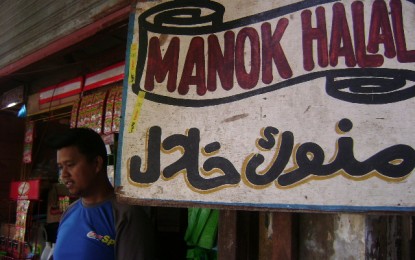
ZAMBOANGA CITY -- “Halal” -- it is a sign that hangs at some beef and poultry shops as well as eateries here, in an attempt to lure Muslims to patronize stuff from them.
No agency, however, checks and certifies the authenticity of these “halal.” And for Muslims, eating kosher is not only a healthy practice, but a divine order.
There at least 300,000 Muslim residents in the city, whose total population is estimated to be over 1.1 million. In fact, thousands of Muslims from nearby provinces come to buy their food and other needed products in the city.
Today, an ordinance adopted by the Sangguniang Panlungsod of Zamboanga City seeks to ensure that local Muslim residents, or anybody else interested, will get only “certified” halal beef, poultry, and other goods.
The ordinance defines halal as “an Arabic term which means permissible or lawful. When referred to processed, semi-processed or raw food, it is anything which is allowed for consumption by Muslims.”

In many Muslim societies, however, halal also covers non-food items like cosmetics and even zakat -- a personal tax paid as charity which must come from legitimate earnings to be considered halal.
The ordinance is authored by Councilor Maria Paz Abubakar and was enacted by the city council on August 20.
The measure now awaits the signature of Mayor Ma. Isabelle Climaco-Salazar to take effect. It is numbered as Ordinance No. 489, and titled “An Ordinance Establishing the Halal Inspection and Monitoring Council of the City of Zamboanga and for Other Related Purposes”.
In its section on “declaration of policy and purpose”, it states:
“(I)t is the policy of the City to protect the interest of the Muslim populace and safely ensure compliance with international standards of good manufacturing and hygienic practices by institutionalizing a Halal system for food, non-food products and services in recognition and respect for the rich tradition and way of life of the Filipino Muslims.”


The ordinance seeks to create a regulatory body in Zamboanga City to “ensure compliance with the appropriate and applicable laws relative to Halal implementation.”
Under the measure, business establishments that cater to Muslim food and raw products must acquire Halal certification from accredited certifying body , before posting the “Halal” word or “Halal” logo in their establishments.
The logo, the ordinance states, refers to the common logo as adopted by the Philippine Halal Export Development and Promotions Board to be adopted by the body or entity, such as the ordinance’s ordained council.
Among its powers and functions are drafting an ordinance on halal at the soonest time that will specify the mechanics and regulatory standards to guide the council, ensure compliance of the ordinance, inspect establishments, and investigate violations.
The body will be composed of the city mayor as chairman and the regional directors of National Commission on Muslim Filipinos and Department of Trade and industry as vice-chairmen.
Its members include the regional directors of the Department of Science and Technology and Department of Agriculture; three Muslim scholars, a representative of a Muslim professional group, a Shariah counselor, the city council chairman of the Committee on Muslim and Cultural Affairs, City Agriculturist, City Veterinarian, and the chief of the city government permits and licensing office.
The enforcement agencies are the Philippine National Police, city health office and the city ordinance enforcement unit.
For its precedent legal bases, the ordinance cites RA 10817, otherwise known as the “Philippine Halal Export Development and Promotion Board”; RA 9997, the “National Commission on Muslim Filipinos Act of 2009”; RA 8435, the “Agriculture and Fisheries Modernization Act of 1997”; RA 7394, the “Consumer Act of the Philippines of 1992”; and, RA 3740, which is the “Act to Penalize Fraudulent Advertising, Mislabeling, or Misbranding, Stock Bond, Etc.” (Rey-Luis Banagudos/PNA)
